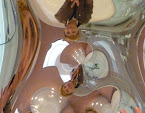
Two years ago I read George Stanley’s selected poems from 1957 until 2000 - A Tall Serious Girl - and I became a fan of his writing.
His recent book, Vancouver : A Poem, in which he moves through urban Vancouver noting changes and seeming to talk to himself as he lets his reader eavesdrop, is just about the best book of poems I’ve read in ages.
There is more here than memory
∇
Reading Paterson on the bus, back & forth. Across the city. The 210.
A man & a city.
I am not a man & this is not my city.
In the bar, George Stanley instructs himself to
Write carelessly &
stop focusing
where a pal's maudlin griefy tears can be shed into Benedictine, where
The mind
edges away
from compassion - imagining
itself compassionate -
leave it to the brain,
leave it to the big boy
to feel, even if it
makes big mistakes, it’s the big boy,
it’s the one
must
(& I will not say die
I’m in the bar,
I’m happy but I’m lost whenever I come
to this point
of embarrassment as if to take over
knowledge that not yet
exists, is, write carelessly, write
at the brink
(like a skateboarder I just saw on TV -
wake up! what time is it? -
crash into the oblong
bales of hay - set up -
He aims
not to be a man
to be a thought
This is the publicity description of the contents of the book :
The Lions [the twin mountain peaks visible from the city] bare of snow, crowded express buses, a giant red turning letter W. 'Vancouver: A Poem' is George Stanley's vision of the city where he lives, though he does not call it his own. Vancouver, the city, becomes Stanley's palimpsest: an overwritten manuscript on which the words of others are still faintly visible. Here the Food Floor's canned exotica, here the stores of Chinatown, here the Cobalt Hotel brimful of cheap beer and indifferent women.The poet travels through the urban landscape on foot and by public transit, observing the multifarious life around him, noting the at times abrupt changes in the built environment, and vestiges of its brief history. As he records his perceptions, the city enters his consciousness in unforeseen ways, imposing its categories and language. Skirting chestnuts on the sidewalk or reading William Carlos Williams's 'Paterson' on the Granville Bridge, the poet travels along the inlet, past the mountains, under the trees, interrogating the local world with his words.
Many of the first drafts of ‘Vancouver: A Poem’ were written in transit, on the bus or on SkyTrain. Others took their first shape in bars or restaurants. George Stanley has learned, he says, "more and more to let the poem write itself. Not to get in the way of the poem."
City of death, city of friends.
Even though it is not his city, George Stanley, originally from San Francisco, and now aged 75, has lived in Vancouver for over thirty years, long enough to have made friendships, acquaintances, to have taught many English classes, and to frequent a favourite local bar. He has passed by the same shops and buildings on bus rides and on foot, and he marks their various transitions. His poems observe tree roots lifting paving stones on the sidewalks, gold ink graffiti on the bus floor, the places where you can go to pee, like Pacific Centre Mall or McDonald's, and so on. When a local bar is closing to be reinvented as some other venue he calls it 'Reterritorialization'.

Seniors
Seniors know everything.
Correction: Each senior knows everything.
The others don’t want to hear about it.

3 comments:
Interesting. I'll check it out. Thanks!
A number of years ago the 'Canadian-American' poet Kevin Davies recommended George Stanley to me when Kevin and I were working together in an office in lower Manhattan. Kevin Davies' new book 'The Golden Age of Paraphanalia' has just received a glowing and intelligent review in 'The Nation' by Jordan Davis, about whose flarf contribution in 'Jacket' I am so enthused. I come to Davis and his review by way of commenting on flarf earlier on, and so back to Kevin Davies and now back again to George Stanley. This provident circle thrills me and gives me much to look forward to. All of this is much more meaningful than coincidental, and it all relates nicely if perhaps loosely -- especially, I am inclined to expect, the connection that may appear to be evident between the two new books by Davies and Stanley. (From Robert Mueller)
Hi Robert,
Thanks.
I'll read Kevin Davies book too.
Pam
Post a Comment